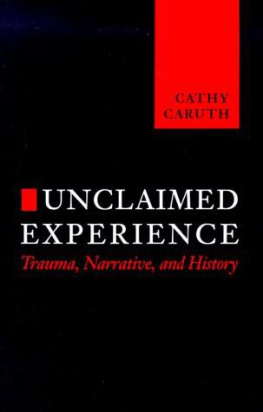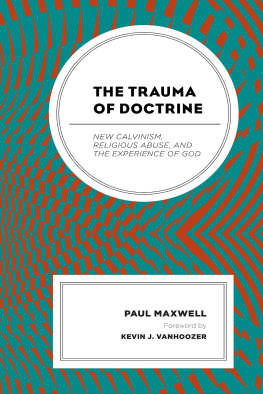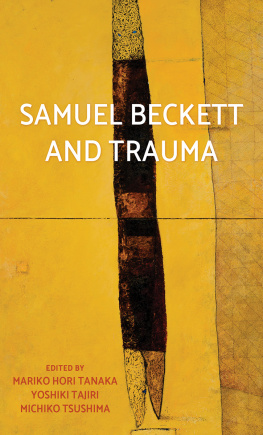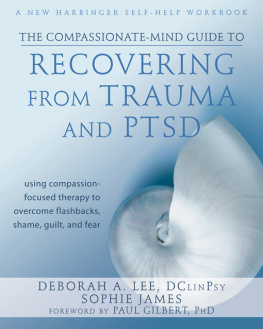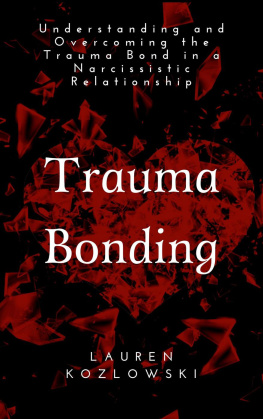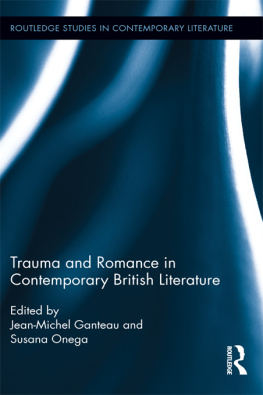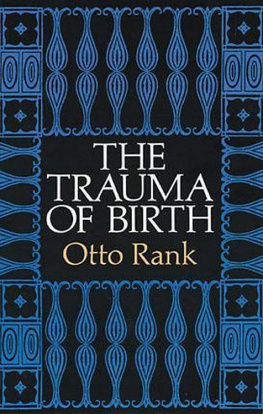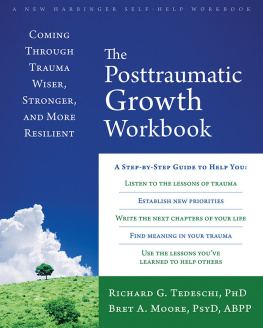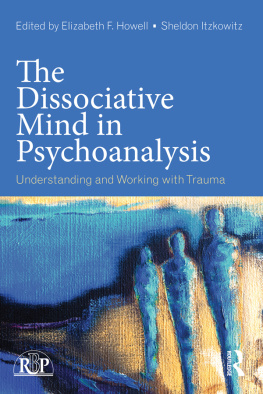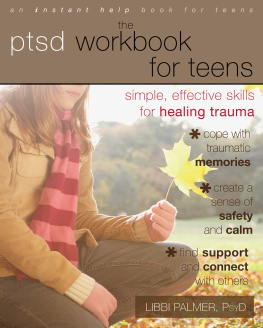Table of Contents
1996 The Johns Hopkins University Press
All rights reserved. Published 1996
Printed in the United States of America on acid-free paper
98765432
The Johns Hopkins University Press
2715 North Charles Street
Baltimore, Maryland 21218-4363
www.press.jhu.edu
Library of Congress Cataloging-in-Publication Data will be found at the end of this book.
A catalog record for this book is available from the British Library.
ISBN 0-8018-5246-3
ISBN 0-8018-9619-3 (pbk.)
To the students of Literature, Trauma, and Culture
ACKNOWLEDGMENTS
I am grateful to Shoshana Felman for her inspiring work on testimony, for her astute listening, and for her deeply resonant responses to my writing. I would like to thank Geoffrey Hartman for a rich and complex dialogue on history and representation. Dori Laub, M.D., first introduced me to the world of contemporary trauma studies and has provided an ongoing dialogue on clinical trauma research. Cynthia Chase has been a crucial interlocutor in my thinking about trauma, and Jill Robbins has provided central insights into the relation between trauma and ethical thought. I am also grateful to Kevin New-mark for his excellent and thoughtful responses. Tom Greene has been a longtime interlocutor and has helped me to consider the literary dimensions of my study. And Harold Bloom has continued to provide a lively exchange on psychoanalysis and literature.
Others who have contributed with insight and careful judgment are Dolora Wojciehowski, Thomas Keenan, Thomas McCall, David Guenther, Lynn Enterline, Susan Nathiel, and my parents, who offered important insights concerning psychoanalytic theory. My former students Marjorie Allard, Michael Jasny, and Robert Hughes provided excellent and enthusiastic research. I would like, in addition, to thank each of my students in the different versions of Literature, Trauma, and Culture, who meant so much to me during the writing of this book and who added immeasurably to the thinking that went into it. In the last stages, Joanne Allen did a meticulous job of copyediting, and Carol Zimmerman offered careful help with the proofs. Finally, I am grateful to Elizabeth Rottenberg for her engaged listening and for her crucial interventions.
Earlier versions of several chapters of this book have previously been published: chapter I in Yale French Studies 79, Literature and the Ethical Question, ed. Claire Nouvet (winter 1991); chapter 4 in the Yale Journal ofCriticism, October 1990, and reprinted in Critical Encounters: Reference and Responsibility in Deconstructive Writing, ed. Cathy Caruth and Deborah Esch (New Brunswick: Rutgers University Press, 1995); and a shorter version of chapter 5 in Performativity and Performance, Essays from the English Institute, ed. Andrew Parker and Eve Sedgwick (New York: Routledge, 1995).
INTRODUCTION: THE WOUND AND THE VOICE
Though chilled with horror,
with a second blow
He struck it, and decided then to look.
Torquato Tasso, Jerusalem Liberated
In the third chapter of Beyond the Pleasure Principle, Freud describes a pattern of suffering that is inexplicably persistent in the lives of certain individuals. Perplexed by the terrifyingly literal nightmares of battlefield survivors and the repetitive reenactments of people who have experienced painful events, Freud wonders at the peculiar and sometimes uncanny way in which catastrophic events seem to repeat themselves for those who have passed through them. In some cases, Freud points out, these repetitions are particularly striking because they seem not to be initiated by the individuals own acts but rather appear as the possession of some people by a sort of fate, a series of painful events to which they are subjected, and which seem to be entirely outside their wish or control. The most moving poetic picture of a fate such as this, Freud writes, can be found in the story told by Tasso in his romantic epic Gerusalemme Liberata:
Its hero, Tancred, unwittingly kills his beloved Clorinda in a duel while she is disguised in the armour of an enemy knight. After her burial he makes his way into a strange magic forest which strikes the Crusaders army with terror. He slashes with his sword at a tall tree; but blood streams from the cut and the voice of Clorinda, whose soul is imprisoned in the tree, is heard complaining that he has wounded his beloved once again.
The actions of Tancred, wounding his beloved in a battle and then, unknowingly, seemingly by chance, wounding her again, evocatively represent in Freuds text the way that the experience of a trauma repeats itself, exactly and unremittingly, through the unknowing acts of the survivor and against his very will. As Tassos story dramatizes it, the repetition at the heart of catastrophethe experience that Freud will call traumatic neurosis emerges as the unwitting reenactment of an event that one cannot simply leave behind.
I would like to suggest here, however, that the literary resonance of Freuds example goes beyond this dramatic illustration of repetition compulsion and exceeds, perhaps, the limits of Freuds conceptual or conscious theory of trauma. For what seems to me particularly striking in the example of Tasso is not just the unconscious act of the infliction of the injury and its inadvertent and unwished-for repetition, but the moving and sorrowful voice that cries out, a voice that is paradoxically released through the wound. Tancred does not only repeat his act but, in repeating it, he for the first time hears a voice that cries out to him to see what he has done. The voice of his beloved addresses him and, in this address, bears witness to the past he has unwittingly repeated. Tancreds story thus represents traumatic experience not only as the enigma of a human agents repeated and unknowing acts but also as the enigma of the otherness of a human voice that cries out from the wound, a voice that witnesses a truth that Tancred himself cannot fully know.
It is the moving quality of this literary story, I would suggestits striking juxtaposition of the unknowing, injurious repetition and the witness of the crying voicethat best represents Freuds intuition of, and his passionate fascination with, traumatic experiences. If Freud turns to literature to describe traumatic experience, it is because literature, like psychoanalysis, is interested in the complex relation between knowing and not knowing. And it is at the specific point at which knowing and not knowing intersect that the language of literature and the psychoanalytic theory of traumatic experience precisely meet. The example offered by the poetry of Tasso is indeed, in my interpretation, more than a literary example of a vaster psychoanalytic, or experiential, truth; the poetic story can be read, I will suggest, as a larger parable, both of the unarticulated implications of the theory of trauma in Freuds writings and, beyond that, of the crucial link between literature and theory that the following pages set out to explore.
A DOUBLE WOUND
As the repeated infliction of a wound, the act of Tancred calls up the originary meaning of trauma itself (in both English and German), the Greek trauma, or wound, originally referring to an injury inflicted on a body.
What the parable of the wound and the voice thus tells us, and what is at the heart of Freuds writing on trauma, both in what it says and in the stories it unwittingly tells, is that trauma seems to be much more than a pathology, or the simple illness of a wounded psyche: it is always the story of a wound that cries out, that addresses us in the attempt to tell us of a reality or truth that is not otherwise available. This truth, in its delayed appearance and its belated address, cannot be linked only to what is known, but also to what remains unknown in our very actions and our language.

